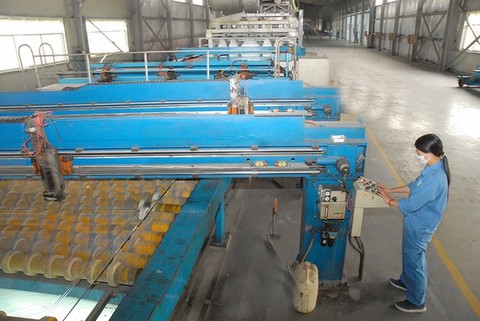
A construction glass manufacturing plant in Bình Dương Province. Cement, tile and construction glass industries in Việt Nam are seeing a large surplus, and as a result future investment in these industries should be carefully considered. — Photo sggp.org.vn
Cement, tile and construction glass are seeing excess supply over demand, according to the Ministry of Construction.
Thanks to high investment in the three industries, the combined total output has already nearly reached their output target for 2025.
In 2020 cement manufacturers in Viet Nam produced over 104 million tonnes of cement, but only 62 million tonnes were sold in the domestic market, and 38 million tonnes were exported.
According to the Viet Nam Cement Association, domestic demand is slowing down, leading to fierce competition between suppliers in the country.
Due to lower domestic demand, businesses are looking into exports to get rid of their stock, despite unfavourable prices. In 2020 the country exported cement at an average price of US$37 per ton, which was lower than the price in 2018 ($40).
Exports of cement and clinker in the first five months of the year rose by 50 per cent year-on-year. This is because the country had expanded its cement exports in developing countries, said Luong Duc Long, vice president cum general secretary of the association.
However, he said that export of cement to these markets was unsustainable because these countries were also focusing on developing their domestic cement industries.
The construction glass industry is also seeing higher supply than demand, with an excess output of 80 million square metres in 2020. Several manufacturers have had to close down some of their production lines.
Meanwhile, tile manufacturers in Viet Nam produced 560 million square metres worth of tiles in 2020, but only 465 million square metres of them were sold.
Domestic tiles also have to compete with imported tiles that are not certified or closely monitored for quality and pricing, according to the Viet Nam Building Ceramic Association.
Chinese tile products, which account for up to 25 per cent of Viet Nam’s market, are sold very cheaply.
According to construction material manufacturer CMC Joint Stock Company, which recorded a 14 per cent drop in revenue in 2020, excess supply over demand contributed to harsh competition last year, with businesses making large price cuts just to get rid of their stock.
Nguyen Van Sinh, deputy minister of construction, said that proposed investment projects in these three industries should be reconsidered, and localities should seek opinions from state authorities to avoid excessive investment and waste of manpower.
He said that investment in cement production in large cities and areas in need of environmental protection should be limited. — VNS